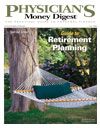An Old-school Doctor's Musings on a Career
It may seem naïve in the current economicenvironment to admit thatduring my entire medical training Ido not recall being involved in so muchas one conversation about money. It justwasn't done. I suppose we assumed thatif we took good care of our patients,that our families would be fed and educated,and we would ease into a comfortableretirement if and when itbecame necessary. Notice that I saidnecessary; one of the expectations aboutpracticing medicine was that you neverhad to retire as long as you were physicallyable to carry on. Therefore, savingfor retirement was less importantbecause you could always "keep a handin" practicing medicine.
So I was thrust into the world withnary a clue about how to start a practiceor a financial life. But since then, bothmedical practice and its financial sidehave become more complex by a quantumfactor, requiring a more knowledgeablehead start. For an old-schoolexample, I'll never forget the shockedlook on my partners' faces when I firstdeclaimed that we, in fact, were runninga business and should conduct ourselvesappropriately.
All too often developing and runninga medical office was and is trial anderror, the blind leading the blind. Onesmart/lucky thing that I did do was toannually fund my then-new professionalcorporation retirement plan from thebeginning. I was just getting started andwouldn't miss what I wasn't used tospending. And my older colleagues werepleased to be able to put off the tax collectorfor the first time. These are truefactors that still apply today.
Physician's Money Digest
Now, for an increasing number ofdocs, medicine changes so fast and hasbecome so technically demanding that apart-time "keeping your hand in" approachlate in your career to sustain youis often a chimera. This puts more financialpressure on having saved enough tolive comfortably in our newfound"retirement" without working for alonger period than ever before. Also,Americans are living longer and face a"life mulligan," if you will; it's a chanceto reinvent ourselves, health and nest eggpermitting. Medical training and affiliatedorganizations have been remiss withneglecting the teaching of the necessityand value of financial planning for toolong. It is only in recent years that thereis information readily available onfinance within the greater medical community,but even so most docs unnecessarilystart from square one. So into thebreach comes to save the day with its annual Guide toRetirement Planning. You are lucky tohave what I and so many others did not;free, knowledgeable, accessible adviceon how to get started and what to do.Take advantage of our experience/scars,and I hope that you finish the issue withmore confidence to give your futuremore options.
